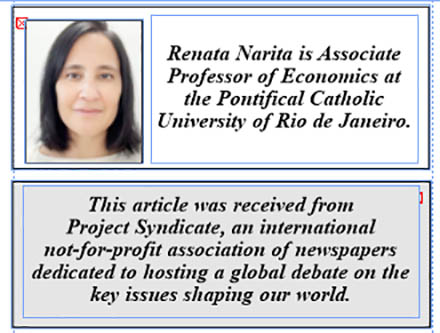By Renata Narita
RIO DE JANEIRO – Despite robust labor regulations, Latin American countries have exceptionally high turnover rates. Roughly 24-44% of workers in Argentina, Brazil, Ecuador, Mexico, Paraguay, and Peru quit each year, and 30-50% of them exit the workforce.
Of course, workers vary in education levels, commitment to finding employment, compatibility with their current positions, and willingness to accept job offers. But these high turnover rates can be largely attributed to the unregulated informal sector, which accounts for more than 40% of the workforce in many Latin American and Caribbean (LAC) countries. The lifespan of informal jobs tends to be significantly shorter than that of formal jobs, owing to the lack of adequate regulations and benefits.
Of course, not all transitions are bad. Moving from low- to high-productivity jobs, for example, can boost wages, especially early in a worker’s career, and help them secure better, more stable jobs with opportunities for promotion. But in many economies, younger and less educated workers tend to change jobs more often. Consequently, they receive less training, on-the-job learning and experience; suffer slower wage growth, and are more likely to move from formal jobs to the informal sector or leave the workforce altogether. In this way, high turnover can impede human-capital accumulation.
Given that job transitions are more common in the informal sector, it is reasonable to expect that Latin America’s high turnover rates will exacerbate labor-market inequalities in the long run. But so far, there has been little empirical evidence to support this view.
In a recent study, my co-author Naercio Menezes-Filho and I explore the relationship between employee turnover and wage inequality. By analyzing labor-mobility patterns in five Latin American countries – Argentina, Brazil, Chile, Ecuador, and Mexico – we show that high turnover rates might indeed exacerbate existing wage inequalities.
At first glance, our findings suggest that workers who switch jobs experience faster annual wage growth than those who stay in their current positions, reflecting the immediate gains that finding new employment can provide. In line with previous studies, we find that younger people, in particular, benefit more from the positive effects of changing jobs. This is true even in the formal sector, where higher investment in human capital usually encourages employee retention.
By analyzing wage distributions, we were able to compare actual wage outcomes to hypothetical scenarios where individuals did not switch jobs. We found that job transitions can contribute to short-term declines in inequality, as they initially benefit lower earners and younger people. But as human capital accumulates over time, the benefits of job stability can outweigh those of seeking new positions. Consequently, those who frequently change jobs experience slower long-term wage growth. Given that unskilled workers change jobs more often, this suggests that high turnover increases inequality in the long run.
To be sure, other factors, such as non-wage benefits, also play a crucial role. For example, after Brazilian firms introduced private health insurance, the country’s formal sector hired fewer workers and fired more due to increased labor costs. Similarly, the introduction of public health care for informal workers and the unemployed in Mexico has resulted in fewer people moving to the formal sector. Given that less-educated individuals and women are more likely to work in the informal economy, this has impeded efforts to reduce existing wage disparities.
Nevertheless, our empirical findings underscore the need to address the adverse economic effects of high turnover. While younger people benefit from changing roles in the short term, those who frequently change jobs tend to experience slower average wage growth. Informal workers, in particular, find it more difficult to move to high-skill, well-paid jobs. This limits their ability to accumulate human capital and likely impedes economic growth in LAC countries, where the informal sector employs a significant share of the population.
To reduce wage inequality, LAC governments should implement policies that create incentives for workers to shift from informal to formal employment. Specifically, they should focus on removing barriers to formalization and creating an environment in which employees can develop new skills and advance to higher-quality, better-paying positions. By facilitating positive turnover and encouraging investment in human capital, policymakers can lay the groundwork for a more equitable labor market.
Copyright: Project Syndicate, 2024.




